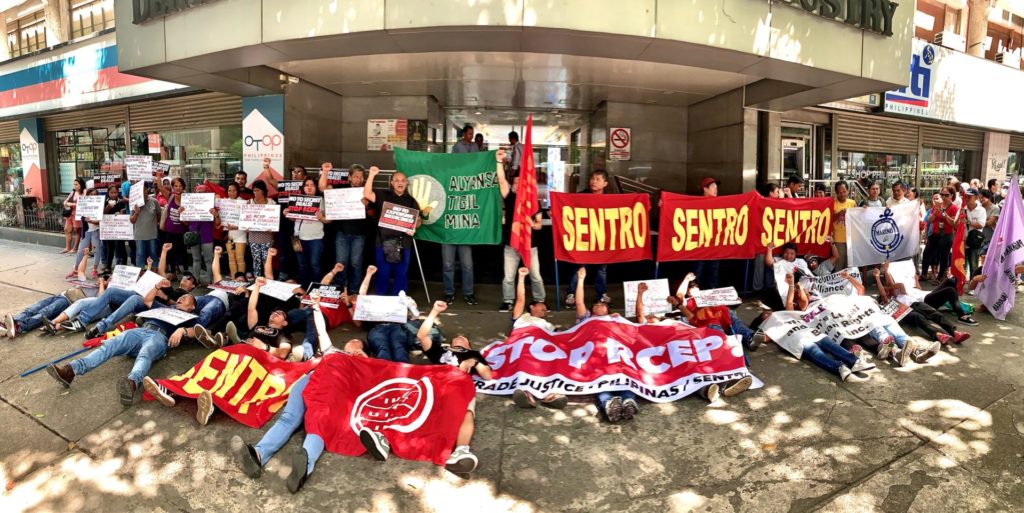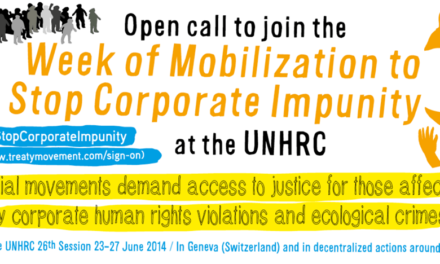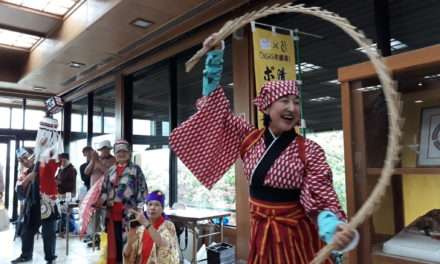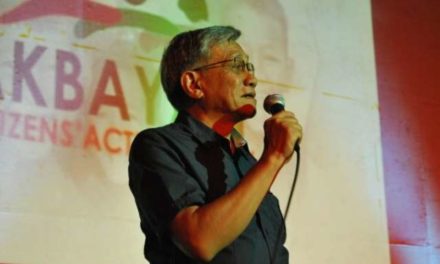
Trade Justice activists stage a die-in at the Department of Trade and Industry office in Makati City, Philippines to dramatize their opposition to RCEP. 4 November 2019. Photo by Del Banares of SENTRO.
by Joseph Purugganan
Governments are now scrambling to conclude negotiations for the Regional Comprehensive Economic Partnership Agreement (RCEP), the mega free trade and investment deal launched 7 years ago by the ten countries that comprise the Association of Southeast Asian Nations (ASEAN), plus its six dialogue partners, namely China, India, Japan, South Korea, Australia and New Zealand.
Since its launch in 2012, RCEP was touted as the “biggest regional free trade deal” covering 50 % of the world’s population, and 29 % of global trade. ASEAN, which was central to the negotiations, viewed the talks as signaling the bloc’s “determination and commitment of to play the lead and central role in the emerging regional economic architecture.”[1]
Coming together under an ambitious trade deal was also seen as a collective response to the global economic downturn that saw global trade contract by as much as nine percent in 2009.[2] The aim was to conclude a modern, comprehensive, high quality, and mutually beneficial economic partnership by 2015 as a way to boost economic growth and equitable development and advance regional cooperation and integration.[3]
It is interesting to note that the last ditch efforts to conclude this deal, after several missed deadlines and over the course of 28 rounds of negotiations, again comes at a time when there is a considerable slow down in global trade.[4] Amidst both a strong political push, and a clear economic agenda however are serious concerns over the possible long term negative impacts on people’s lives, livelihoods and rights.
Stumbling blocks
There have been a number of stumbling blocks over the years to the speedy conclusion of the talks.-At the onset, the negotiations revolved around questions of power and leadership in the region with the two powers from Asia—China-and Japan trading proposals on how to shape and influence the agenda.-Then there is also the geopolitical angle, with RCEP viewed as being China-led and driven by Beijing’s efforts to assert its leadership in the region at the time that the United States and Europe were also engaged in negotiations for mega regional deals themselves—the-US with the Trans-Pacific Partnership (TPP), the EU with its FTAs across Asia, and both of them engaged in the Transatlantic Trade and Investment Partnership (TTIP). More than just a competition over market, the battle was over trade rules—who gets to set the rules and whose interests should be favored or protected by these rules.- As the US Trade Representative Office warned, “The rules of the road are up for grabs in Asia. If we don’t pass this agreement and write those rules, competitors will set weak rules of the road, threatening American jobs and workers while undermining US leadership in Asia.”[5]
21st Century challenges need new and modern trade and investment regime was the common mantra. All the big players aspired for new generation FTAs: agreements that go beyond issues of tariffs and market access. In the face of an already highly liberalized trade environment from years of trade liberalization measures, these new agreements are more ambitious and exert greater influence over domestic economic policies. They are comprehensive covering not just trade in goods, but also services, investment, intellectual property rights, and now also electronic commerce.-These agreements also restrict policy space by putting prohibitions on measures that are used by states to ensure development that favors their national interests.
Ambition has been a huge stumbling block as well. While there was a general aspiration for a high-quality and comprehensive agreement, concerns were raised by the negotiating parties over the level of ambition.
At one point RCEP lost momentum as parties—who were also negotiating another ambitious deal,the TPP—put priority on the US-led negotiations.[6] Compared to the TPP, which was at one point viewed as the gold standard of what an ambitious and comprehensive new generation agreement should be, RCEP, at its early stages, was described as a “conventional trade agreement that is thin on rules.”[7] RCEP was given a big boost when TPP was sidelined after US President Donald Trump pulled the US out of the talks in 2017.
There were also clear divergent views on a number of contentious RCEP chapters. For example the controversial investor-state-dispute settlement mechanism (ISDS) that gives corporations the power to sue states; and the Intellectual property rights chapter, which would force developing countries with weaker IPR regulations to amend their laws to comply with higher standards of protection.
India’s concerns over the impact of further liberalization in goods to its expanding trade deficit with China became a potential deal breaker towards the latter part of the negotiations.-Among the existing FTAs between ASEAN and its partners in RCEP, the ASEAN-India FTA is the least ambitious with commitments to eliminate tariffs covering only 79.6 % of tariff rates on average. RCEP would force India to increased tariff coverage, leading to-fears that cheaper imports from China and the rest of RCEP countries would flood and devastate the Indian domestic economy. India’s trade deficit with RCEP, which stood at $54 billion in 2013-14 had increased to $105 billion in 2018-19.[8]
Within ASEAN, a big concern is over the asymmetrical levels of development among the 16 RCEP country parties, which could temper the level of ambition that can be acceded to.-Under the ASEAN’s guidelines on RCEP, governments gave due recognition to “the different levels of development of the participating countries” and stated the imperative to include “appropriate forms of flexibility including provision for special and differential treatment, plus additional flexibility to the least-developed ASEAN Member States, consistent with the existing ASEAN+1 FTAs, as applicable.”
While ASEAN has consistently asserted ASEAN centrality in the negotiations, that hardly is the case in terms of economic size and power. China, Japan, India, South Korea, and Australia represent the biggest economies in RCEP in terms of GDP. Indonesia, Thailand, Malaysia, Singapore and the Philippines complete the top 10, with the rest in the tail end.
Desperate to show progress
What was envisioned to be a quick process with the target to conclude negotiations by 2015 has dragged on for over seven years already. Desperate to move forward amidst growing trade tensions between the United States and China, RCEP country parties (RCP’s) have intensified the talks as well as rhetoric on the progress of the talks.-Chapters on economic and technical cooperation, and small and medium enterprises were the first two chapters to be concluded in 2016. At the conclusion of the 2nd Summit in Singapore in 2018, RCEP’s reported the conclusion of seven additional chapters, namely, customs procedure and trade facilitation (CPTF), government procurement, institutional provisions, sanitary and phyto-sanitary measures, standards, technical regulations and conformity assessments.[9]
News from what has been reported as the final round, the 28th round of talks in Danang, Vietnam indicate that the negotiations have now progressed with 13 out of the 20 chapters concluded.-And now ahead of a crucial intersessional meeting in Bangkok, reports are coming out that the deal is almost done with 21 out of 25 chapters -being completed. Several crucial chapters of Investment, Electronic Commerce, Rules of Origin, and Trade Remedies are yet to be settled.[10]
People’s View
The people’s opposition to RCEP has also been sustained over the last seven years, and the message has consistently been to call on governments to reject the agreement.
In the “Speak Out Against RCEP” activity held recently in Thailand at the ASEAN Civil Society Conference/ASEAN Peoples Forum, representatives from people’s organizations, NGOs and social movements made a last-ditch demand to governments to reject RCEP. The message coming from these movements could not have been clearer. RCEP is a threat to peoples’ lives and livelihoods. It is an agreement that advances the agenda of corporations first and foremost. It is an agreement cloaked in secrecy and negotiated with limited public scrutiny. Groups called on their respective governments to heed the concerns of the people and cease from forging this deal.
Afgan Fadilla of Serikat Petani Indonesia (SPI, or Indonesian Peasant Union), a member of the global peasant movement La Via Campesina, spoke against the assault on farmer’s rights to seeds.-“In East Java and Aceh, peasants are forcefully arrested by the police for breeding their own seeds.”-Fadilla decried UPOV 91, the international convention that seeks to protect breeder’s rights, but would undermine peasant’s right to seeds. Accession and compliance to UPOV 91 is one of the contentious issues being discussed under the intellectual property rights chapter of RCEP. Fadilla also stated that implementation of UPOV 91 will violate United Nations Declaration on the Rights of Peasants and Other People Working in Rural Areas (UNDROP) which guarantees the right to seed of peasants.[11]
Aside from undermining farmer’s right to seeds, the IPR chapter also threatens people’s access to medicines and right to health. Chalermsak Kittitrakul of the health advocacy group AIDS Access Foundation in Thailand expressed people’s fears that RCEP’s could further push upward the cost of medicines, which accounts for 50 percent of the total expenditures under the health subsidy program of the government, and thereby lead to reduction of coverage or worse a halt subsidies altogether.
While some contentious issues like data exclusivity and other TRIPs+ provisions seem to have been put off the table for now, advocates like Kittitrakul are still concerned that IPR rules and strong enforcement mechanisms are very much still a part of the negotiations. “RCEP is also pushing for establishing high standards for patent examination, which would favor Big Pharma who could easily comply with these standards over smaller generic companies.”
RCEP would also have severe impact on women. According to Reasey Seng of the Cambodian organization SILAKA, “women are concerned over the privatization of public services and limited access for women to land and natural resources. RCEP will push a policy environment that favors more privatization of services, contractual and precarious work, and corporate control over land and resources, which would further burden women and reinforce the patriarchal system.“ Ana Maria Nemenzo of Woman Health, a women’s group focusing on health issues in the Philippines lambasted RCEP for “privileging corporate interest, and limiting the capacity of government to support public health.” “By supporting RCEP and other such trade and investment agreements, governments are taking the side of Big Pharma over peoples’ health and welfare,” Nemenzo added.
Workers are also among those who will feel the brunt of an unjust trade deal Kosal, a Cambodian garment worker, fears RCEP will negatively affect working conditions in Cambodia. “RCEP will push for a labor policy regime that favors low wages, high production target, longer work hours, contractual work and more precarious work.”
Another key concern underpinning people’s opposition to RCEP is on ISDS. Representing Focus on the Global South, and Trade Justice Pilipinas (TJP) network, this author expressed our strong opposition to ISDS calling it “a toxic element of RCEP and echoed calls to reject the agreement altogether.
The statement further stated:
We oppose ISDS and the attack against public policies and stronger regulations. ISDS will exacerbate the asymmetry in law and protection that already exists—where corporations are protected by hard law of trade and investment agreements and commercial contracts, while affected peoples only have access to soft law provided by human rights conventions and declarations.”
We oppose the corporate agenda underpinning RCEP and we assert the primacy of human rights over these unjust trade and investment agreements.
The 1,000-strong delegates to the ACSC/APF 2019 coming from eleven Southeast Asian countries adopted the call to: “reject RCEP and other new generation free trade agreements, and initiate processes to review existing trade and investment agreements.”
National and regional campaign efforts
Various national level campaigns and actions have been initiated over the years by such networks as the Trade Justice Pilipinas, People over Profit, the Indonesia for Global Justice, the Forum against FTAs in India, and the Australian Fair Trade and Investment Network (AFTINET) among others. These groups have been at the forefront of efforts to inform and mobilize the public on RCEP, as well as engage directly with governments and trade negotiators.
Trade unions have also been a major force supporting the anti-RCEP efforts. Unions for Trade Justice, for example, have organized and led regional and national level conferences aimed at consolidating the position of unions in Asia Pacific region against RCEP.
Mobilizations have also been an integral part of the push back against RCEP. In 2017 at the sidelines of the 19th round of talks in Hyderabad, India, a coalition of Farmer Unions, Trade Unions and civil society organized the People’s Convention on RCEP and Free Trade Agreements. A rally was organised on July 24th where over 700 people came out against RCEP, and a press conference was held where key civil society activists from India and the rest of the region outlined their opposition to RCEP.[12]
At the regional level, groups have come together under a loose mechanism for coordinated actions on RCEP. Adopting the inside-outside strategy for campaigning, the RCEP coordinating group has effectively pushed the peoples agenda by combining strong social movement campaigning at the national level, the expertise of groups and individuals considered veterans in the TPP campaign, experts who have analyzed what limited negotiating text can be obtained, and engaging directly with negotiators.
Regional platforms like the ASEAN Peoples Forum and the Asia-Europe People’s forum (AEPF) have provided spaces for assemblies and workshops that helped raise the consciousness of social movements and progressive parliamentarians about the RCEP and mega FTAs. This included as well ASEAN Parliamentarians for Human Rights, which had consistently organized discussions and issues statements against the mega deal.
Stakeholder Engagement
Movements have also actively engaged the RCEP Stakeholder Engagement process for several years. While the space is quite limited, as groups are only given a few minutes to make interventions to directly address trade negotiators, civil society groups and social movements have used this space to articulate strong criticisms, and calls to reject the agreement. The interventions of farmers, fishers, rural women, patients networks, health activists, workers have over the years consistently denounced the ambitious agenda of RCEP and warned of the far-reaching implications on peoples rights and livelihoods.
Conclusion
The latest developments in the negotiations seem to indicate that governments have agreed to set aside the more contentious areas of the agreement in favor of moving the process forward. The provisions on investment arbitration and investor protection for example seem to have been sidelined for the time being, so have the contentious provisions in the intellectual property chapter. These two provisions have consistently been the targets of strongest criticism from peoples’ movements.
These provisions seem to be off the table for the time being, which in a way is a recognition that the strong push back from movements had some effect. However, there is a strong possibility that these toxic provisions might be resurrected in a few years time when the conditions for a much more ambitious and comprehensive agreement are ripe. The struggle therefore against RCEP would have to continue even if political agreement is achieved. In the meantime however, as states continue to debate on RCEP, the peoples campaign against will continue to intensify.
Notes
[1] ASEAN Secretariat News. November 2012. ASEAN and FTA Partners Launch The World’s Biggest Regional Free Trade Deal. Online : https://asean.org/asean-and-fta-partners-launch-the-world-s-biggest-regional-free-trade-deal/
[2] World Trade Organization. 2009. WTO Press Release. Online: https://www.wto.org/english/news_e/pres09_e/pr554_e.htm
[3] Joint Declaration for the launch of negotiations for Regional Comprehensive Economic Partnership. November 2012. Online https://www.mofa.go.jp/mofaj/press/release/24/11/pdfs/20121120_03_01.pdf.
[4] Goodman, P. Global Trade is Deteriorating Fast, Sapping the World’s Economy. New York Times. 2 October 2019. Online https://www.nytimes.com/2019/10/01/business/wto-global-trade.html
[5] United States Trade Representative Office website post on the Transpacific Partnership Agreement (TPP). https://ustr.gov/tpp/ accessed October 2019.
[6] Pongsudhirak, T. Politics of Regional Trade Negotiations. Bangkok Post. 20 Septtember 2019. https://www.bangkokpost.com/opinion/opinion/1753964/politics-of-regional-trade-liberalisation
[7] Solis, M. The case for Trade and the Transpacific Partnership . Brookings. October 2016. Online: https://www.brookings.edu/research/the-trans-pacific-partnership-the-politics-of-openness-and-leadership-in-the-asia-pacific/
[8] Nirmal, R. RCEP: Why Industry and Farmers Fear it. 12 October 2019. Online: https://www.thehindubusinessline.com/economy/the-fear-about-rcep-destroying-domestic-industry-is-not-without-reason/article29653981.ece
[9]ASEAN Summit 2 Joint Leaders Statement. Online:-https://asean.org/storage/2018/11/RCEP-Summit-2_Joint-Leaders-Statement_FINAL2.pdf
[10] Ministry of Commerce and Industry, Government of India. Press Release. Piyush Goyal to Attend 9th RCEP Intersessional Ministerial Meeting in Thailand . 10 October 2019. Online: https://commerce.gov.in/PressRelease.aspx?Id=6719
[11] People’s resistance to RCEP intensifies, amplifying #NotoRCEP call! Statement from the Speak out against RCEP workshop at the ASEAN Civil Society/ASEAN Peoples’ Forum (ACSC/APF) 2019 in Thailand. 10 September 2019. Online at :
People’s resistance to RCEP intensifies, amplifying #NotoRCEP call!
[12] People’s Groups Demand a Halt to RCEP Talks. Report from the Peoples Mobilization in Hyderabad. Focus on the Global South. July 2017. Online at:https://focusweb.org/peoples-groups-demand-a-halt-to-rcep-talks/









